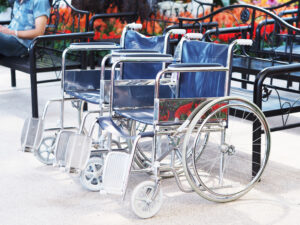I bumped into Maria outside Jefferson Elementary last Tuesday.
Between chasing her kindergartener and balancing coffee, she mentioned they’d just gotten flu shots.
“But honestly,” she confided, adjusting her Elizabeth Panthers tote bag, “I have no idea what other vaccines we need.
The pediatrician mentions things at checkups, but it all blurs together.
Her uncertainty isn’t unusual among families navigating healthcare in our diverse city, where language barriers, work schedules, and cultural perspectives create unique challenges around preventive care.
The Vaccination Landscape in Elizabeth
Beyond October’s Flu Shot Rush

Do You Need A Vaccine in Elizabeth, NJ?
Walk past ShopRite Pharmacy on Elmora Avenue each October, and you’ll spot the familiar signs announcing flu shots. But talk with pharmacy manager David Chen, and you’ll hear a different story. “Elizabeth residents often think vaccination equals flu season,” he told me, organizing a display of multilingual vaccine information. “I’ll have parents bring children for flu shots who’ve missed critical adolescent vaccines, or seniors who don’t realize they need protection against shingles.”
This pattern repeats across healthcare settings throughout our city. At the community clinic near Port Elizabeth, nurse practitioner Sofia Aguilar sees it regularly. “Many families are diligent about infant vaccines and yearly flu shots but miss everything between and beyond,” she explained during her lunch break. “It’s like people mentally file vaccines under either ‘baby shots’ or ‘flu season’ with nothing in between.”
For Elizabeth families juggling multiple jobs, multigenerational households, and sometimes precarious healthcare access, this misunderstanding creates vulnerability gaps. The father working overnight shifts at Newark Airport might miss the tetanus booster that could protect him after a workplace injury. The grandmother caring for grandchildren might unknowingly expose an infant to whooping cough because she doesn’t realize adults need pertussis protection.
Elizabeth’s Unique Immunity Challenges
Our city’s character shapes our vaccination needs in ways national guidelines don’t always capture. “Elizabeth isn’t Westfield or Summit,” observes Dr. James Washington, who’s practiced medicine here for twenty-three years. “We have specific considerations that affect immunity patterns.”
During our conversation at Trinitas Regional Medical Center, Dr. Washington outlined factors that influence Elizabeth’s vaccination landscape: densely populated neighborhoods where infections spread rapidly; households where multiple generations live under one roof; workplaces from port facilities to Newark Liberty International Airport where exposure risks increase; and significant immigrant populations who may have different vaccination histories depending on their countries of origin.
“When I discuss vaccines with Elizabeth families,” he continued, “I’m not just following generic CDC charts. I’m considering where that family lives, works, and how they interact with our community. The school custodian exposed to various germs needs different protection than the remote worker, even if they’re the same age.”
The Vaccines Elizabeth Families Frequently Miss
Adolescent Protection: The Forgotten Middle Years
Thirteen-year-old Miguel’s mother brought him to Neighborhood Health Center last month for a sports physical, revealing they hadn’t visited a doctor since his kindergarten checkup. This scenario plays out regularly across Elizabeth, where healthcare often focuses on early childhood and emergencies, leaving adolescent preventive care in the gap.
“We’re missing crucial opportunities during the middle school and high school years,” explains Elizabeth School District nurse Keisha Johnson. During our walk through hallways plastered with college pennants and growth mindset posters, she shared her concerns. “I see students who received every recommended vaccine through age six, then nothing until they need college vaccination forms—if they get that far.”
This gap leaves Elizabeth teens vulnerable when they need protection most. The HPV vaccine, which prevents several cancers, works best when administered before exposure. Meningococcal vaccines become increasingly important as teens begin activities that increase transmission risks. Yet these vaccines frequently fall through the cracks for Elizabeth families.
“Parents understand the urgency of protecting infants,” notes community health worker Pablo Rodriguez, who conducts outreach at recreation centers and Elizabeth’s youth boxing program. “But explaining why a seemingly healthy teenager needs vaccines requires different messaging. We’ve found success sharing stories about local families affected by preventable diseases.”
The Adult Protection Gap: When Did You Last Check?
When Elizabeth Public Library hosted a health literacy workshop last month, facilitators asked attendees when they last received a non-flu vaccine. Most couldn’t remember. This knowledge gap leaves Elizabeth’s adult population vulnerable to diseases easily prevented through immunization.
“Many adults believe vaccines are completed in childhood,” explains pharmacist Aisha Jackson, whose independent pharmacy serves the Elizabethport neighborhood. “They’re surprised to learn about Tdap boosters, shingles vaccines, or pneumococcal protection. When I ask regular customers about their immunization status, the most common response is ‘I don’t know.'”
This uncertainty affects Elizabeth’s youngest residents too. When expectant mother Jasmine attended a community baby shower at the Elizabeth Coalition to House the Homeless, she learned about the importance of “cocooning”—ensuring all adults who will contact her newborn are current on vaccines, particularly whooping cough. “I had no idea I should ask family members about their shots,” she told me later at a prenatal visit. “My mother thought her childhood vaccines were enough.”
Navigating Access: Elizabeth’s Reality
Beyond Insurance: Finding Affordable Options
At the intersection of East Jersey Street and Division Street, longtime Elizabeth resident Carlos Rodriguez shared his vaccination journey while waiting for the #52 bus. “For years, I thought vaccines were for people with good insurance,” he explained, pulling his warehouse work schedule from a weathered backpack. “Then my buddy told me about the health department clinics. I got caught up on everything during their Saturday hours without missing work.”
Elizabeth’s patchwork of vaccination access points includes traditional medical offices, federally qualified health centers, school-based programs, pharmacy services, and health department initiatives. These options vary in cost, hours, and services offered—creating a confusing landscape for families to navigate.
“We try meeting people where they are,” explains Maria Lopez, who coordinates mobile vaccination clinics that visit Elizabeth’s laundromats, houses of worship, and apartment complexes. “When a parent can get their teenager vaccinated while doing weekly laundry, we remove barriers that might otherwise mean those vaccines never happen.”
Cultural Navigation: Building Trust in Elizabeth’s Communities
In Elizabeth’s Haitian community, pastor Jean-Pierre Clement has become an unexpected vaccination advocate. After initial hesitancy among his congregation, he invited health workers to explain vaccine benefits after Sunday services. “Our people came with questions based on experiences from Haiti, concerns about costs, and worries about immigration consequences,” he explained while showing me their community garden. “Having these conversations in our language, in our spiritual home, made all the difference.”
Similar efforts unfold across Elizabeth’s diverse cultural landscape. At the Portuguese Community Center, senior vaccine ambassadors help older residents navigate online scheduling systems. The Islamic Center of Elizabeth hosts regular “health hours” where medical professionals from the congregation provide culturally sensitive guidance on preventive care, including immunizations.
“Trust doesn’t come from billboards or generic flyers,” notes community organizer Fatima Diallo. “It grows through relationships with respected community members who understand specific concerns. When I talk vaccines with Elizabeth’s West African families, I address different questions than when I’m working with multigenerational Puerto Rican households.”
Resources Elizabeth Families Can Actually Use
Practical Tools for Busy Lives
Elizabeth resident and single father Marco juggles his construction job with raising three children. During a community health fair at Jackson Park, he discovered the NJ Immunization Information System patient portal. “Now I can check all three kids’ records from my phone during lunch breaks,” he demonstrated, proudly showing the color-coded app on his smartphone. “Before, I kept missing which kid needed what.”
Similar practical solutions help Elizabeth families overcome common barriers. The city library now offers vaccine record printing services for residents without home printers. Several local pharmacies maintain evening and weekend hours specifically for vaccinations. And Elizabeth’s WIC office recently began incorporating immunization reviews into benefit appointments, helping parents identify and schedule missing vaccines without additional time away from work.
“We’re trying to meet families in their actual lives, not some idealized world where everyone has unlimited time and resources,” explains Dr. Aisha Williams, who practices at a sliding-scale clinic near Midtown. “That means creating systems that work for the parent picking up kids after a twelve-hour shift or the grandparent who speaks limited English.”
Elizabeth-Specific Information Sources
When longtime Elizabeth resident Carmen Santiago hosted a neighborhood block party last summer, she invited the health department’s multilingual outreach team. “People had questions they’d been afraid to ask their doctors,” she recalled as we chatted on her porch overlooking Elizabeth River. “Having someone explain things in Spanish, while the kids played and adults socialized, made the information feel accessible.”
This community-based approach recognizes that traditional healthcare education often misses Elizabeth’s reality. The city has responded by developing culturally tailored vaccine materials that address specific concerns of our diverse communities and distributing information through trusted networks—neighborhood associations, cultural organizations, faith communities, and local businesses.
“Generic pamphlets don’t answer the questions our families actually have,” notes health educator James Washington. “We’ve created materials addressing everything from halal vaccine options to managing time off work for appointments. When information speaks directly to people’s lived experiences, they’re more likely to act on it.”
Building Elizabeth’s Healthier Future
As our city continues growing—welcoming new immigrants, supporting multigenerational families, and nurturing diverse cultural traditions—comprehensive vaccination protection remains fundamental to community wellbeing. The path forward isn’t through one-size-fits-all approaches but through systems that recognize Elizabeth’s unique character and meet families where they actually live, work, and gather.
By building vaccination awareness that extends beyond annual flu shots, Elizabeth families can strengthen their protection against preventable diseases year-round. From the preschoolers at Mabel G. Holmes School to the seniors at O’Donnell-Dempsey Senior Center, vaccines offer powerful health protection for every stage of life in our vibrant, diverse city.




